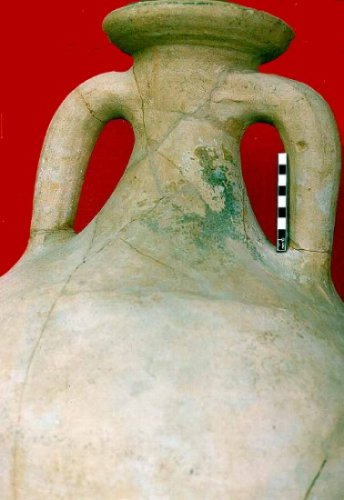|
|
Spanish Amphora from Dorchester-on-Thames: 2nd century AD |

Amphoras are enormous pottery containers used for storage and transport in the Greek and Roman world, reflecting the large-scale shipments of agricultural products such as wine, oil and fish-sauce around the Mediterranean. The two-handled spiked-foot form evolved as convenient for roping together in massed ranks in the hold of the ship; the amphoras were stoppered and sealed with cork, wood or clay.
The commonest type of amphora from Roman Britain is the so-called Dressel 20, used to import olive-oil, and sometimes whole olives, from the Guadalquivir Valley in southern Spain (the Roman province of Baetica) between the towns of Cordoba and Seville, between the 1st and 2nd centuries; this example is probably of the 2nd century when the trade reached its height. Much less olive-oil was imported to Britain in the early 4th century. Perhaps local fats or dairy products more typical of nothern European cooking were being substituted.
Dorchester-on-Thames, about ten miles downriver from present-day Oxford, is a very important site, with an Iron Age oppidum (or central meeting-place of the tribe of the Atrebates) preceding the Roman walled town, which possibly continued in use from the 5th to the 9th centuries, when a Minster church was built just outside the east gate of the Roman town.
© 1998 Oxfordshire Museum Service, Setúbal Museums and the Benaki Museum